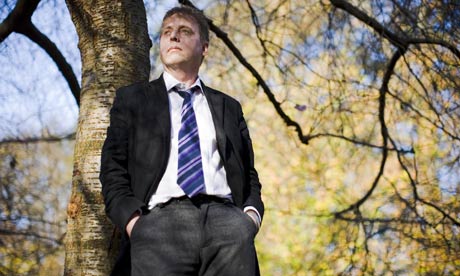
Eight years ago, I was planting trees on a mountainside in my native British Columbia, when a section of the hill came loose and I fell six metres (20ft). Luckily, I landed on soft shale; unluckily, a two metre boulder followed, cracking a couple of minor bones, scraping the flesh from a good part of my face and body, and tearing a gash across the side of my head.
The physical wounds healed quickly, but what lingered was the damage to my brain. The boulder had slammed into the spot just above my temple, making my brain rebound against my skull. It caused mild traumatic brain injury (MTBI, or post-concussion syndrome), which is harder to treat and diagnose than more severe trauma.
The first months after the injury were bewildering. Simple things, such as going to the shop, exhausted me. Suddenly, I had no tolerance for alcohol; one night, after meeting a friend for a few drinks, I walked to my usual bus stop for the ride home – and came to three hours later in another part of the city. I had no idea where I had been or how I had got there.
In the weeks after the accident I would be talking normally, then suddenly stop making sense. I woke up every morning in a haze, my head filled with static, my thoughts random, disconnected. I couldn't read novels – I would finish a page, then have to read it again and again, finally giving up because the words would not sink in. I could taste food, but the taste would not register; the brilliant colours of a summer day were seen as if from a distance. Everything distracted me: I had to struggle to maintain a fluid train of thought. I got sick easily – in the space of a month, I had fever, measles and bronchitis. I had terrible insomnia and when I was tired, I became impulsive, almost delirious, my thoughts scattering about my head like machine-gun fire.
I would also get what I called nerve attacks, when stress or sensory input would overwhelm me and my nerves would begin to clench up, a terrible ache would spread down my skull and I would have to lie in bed for hours or even days – keeping as still as possible.
Treatment for MTBI is almost laughable. When, three months after the accident, I was finally referred to a neurologist, he ran a Cat scan, then told me bluntly that either I was running an insurance scam or the problem was psychological. I finally received treatment through a neuro- psychologist (specialising in the non-physical aspects of a head injury), who referred me to a head trauma centre in Montreal. They came to my flat and watched me do the dishes. They were able to determine that I had problems with concentration, short-term memory, multi-tasking, and spatial organisation.
It was a relief to realise that I was not being lazy or weak. They told me to follow routines and explained that after a head injury the brain has to forge new channels around the damaged neurons. This not only takes time but a great amount of effort; the fatigue is a product of the brain taking all of the body's energy to heal itself.
I stayed focused, thinking that in a month or two the fog would lift. But as one year became two, then three, I began to lose hope and the fog came to rule my life. It was like a constant white noise. I had trouble thinking clearly and being around people; I slurred or stumbled over my words; I felt divorced from all the higher senses – the facility to appreciate art, beauty, love, God. The pain was physically present, like that from a broken limb. Depression followed – the isolation from having to rest so much, from being overwhelmed by being among people became as much of a problem as the injury. I began to drink heavily.
Now, attempting to regain sobriety and stability, I am learning, very slowly, that one has to evolve a new identity around the injury itself. Many aspects of modern life – people nattering on mobiles, loud music, traffic, train announcements – are unbearable. I know that if I am going to live without heavy painkillers, or drinking too much, I have to be somewhat selfish. I have to retreat when I need to, avoid situations that overwhelm me, and accept the days when I can't overcome the injury, when the pain is too much or my thoughts are muddled.
It is strange to look back and realise that for eight years I have been only half-present in my own life, and sometimes I get depressed thinking about all that I have lost – all the time spent in the fog. But over the years I have met a series of people who have suffered head injuries: a Zimbabwean man beaten by Mugabe's thugs who could no longer remember things he had done minutes before, a flatmate who had been clinically dead after a motorbike accident, a manager who had a stroke and woke up unable to recognise his wife or children. These encounters have made me determined to stop drinking, and begin to get my health back; to begin to make my broken sense of self whole again.
Do you have a story to tell about your life? Email it to my.story@theguardian.com. If possible, include a phone number

